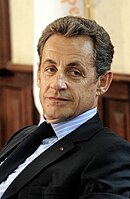President of the Euclean Community
| President of Euclean Community | |
|---|---|
| Style | Your Excellency |
| Residence | Dreessen Building |
| Nominator | Direct popular vote |
| Appointer | Electoral college |
| Term length | Five years, non-renewable |
| Inaugural holder | Bonne Zijlstra |
| Formation | 2006 |
| Deputy | Vice President |
| Salary | €356,600 annually |
The president of the Euclean Community is the chief executive of the Euclean Community (EC), overseeing the activities and direction of the organization. The president leads the Euclean Conference and the Euclean Council, serving as its presiding officer and is responsible for setting its agenda. The president is the senior most representative of the Euclean Community on the world stage and represents it internationally. As part of the position's responsibilities, the president also formally chairs the Euclean Commission. However, the High Commissioner is responsible for overseeing the activities of the Commission.
Until 2007, the presidency of the Euclean Conference rotated semi-annually and was held by the head of state or government of the member state. The 2006 Treaty of Maredoux created the position and stipulated a full-time president for a single five-year term. The position is elected by an electoral college that itself is popularly elected every five years by voters in each member state.
The current president is former Gaullican Member of the Euclean Parliament and Vice President of the Euclean Community Vivien Vallette, who has held the position since 1 December 2022. Vallette was elected to succeed former Taoiseach of Caldia Alexis Walker who was President from 1 December 2017 until 1 December 2022. She was elected to succeed Alexandre Lévesque, a former Gaullican president whose term lasted from 1 December 2012 until 30 November 2017. The first president under the Treaty of Maredoux was Bonne Zijlstra, a former premier of Alsland. Zijlstra served from 1 December 2007 until 30 November 2012. To date, the position has been held by each member of the longstanding coalition in the Euclean Parliament. Ziljlstra and Vallette on for the Socialist Alternative for Euclea, Lévesque for the Alliance of Conservatives and Democrats for Euclea, and Walker for the Euclean Liberal Party.
History
Prior to the creation of the full-time position, the presidency of the Euclean Community was held by head of state or government of the member state in the rotation. It rotated semi-annually, with the first term lasting from January to June and the second lasting from July to December. Initially, the office was known as the president of the Euclean Conference, the body consisting of national leaders. The president was responsible for directing the Conference's agenda and chairing its meetings. The post was created in 1948 under the founding Treaty of Kesselbourg. With the 1964 Treaty of Morwall, the office of the High Commissioner was created. Until 2007, the High Commissioner was the highest-ranking representative of the Euclean Community and was largely responsible for representing its interests abroad.
In the aftermath of the 2005 World Financial Crisis, Euclean leaders discussed the need to create a single office that would provide the Community with direction. A need to streamline cooperation between the Euclean Council, Euclean Commission, and the Conference had also arisen as part of efforts to manage the crisis. In 2006, EC leaders met in the Gaullican city of Maredoux and agreed to a package of reforms. Among them was the creation of a full-time presidency. The presidency of the Conference was replaced with the presidency of the Euclean Community
The Treaty of Maredoux came into effect in 2007 and the first election was held in October and November of that year.
Appointment
Criteria
The eligibility requirements to stand as a candidate for the presidency are similar to those for MEPs. Eligibility can vary by country, but there are some common requirements. A candidate must be 35 years of age or older. Candidates for the Euclean Parliament must be 18 or 21, depending on the country in which they are standing. Euclean citizens are eligible to stand in their state of residency. They are not required to be a national of that member state to stand, consistent with the policy for MEPs.
To be registered as a candidate, an individual must collect at least 25,000 signatures from two thirds of the member states (8 out of 12).
While there is no requirement, it is customary that the president is a former head of state or government from a member state.
Elections
Under the Treaty of Maredoux, the president is elected by an electoral college consisting of 772 electors, requiring a simple majority of electors (387) to become president. Elections for the electors are done in two rounds if no candidates gets 387 electors.
The first round is held in on the first weekend of October. The actual day of the election varies by member state. However, they must be held on that Friday, Saturday, or Sunday. Votes cannot be counted until after voting has finished in all member states. Typically, counting begins after voting stops on Sunday night and the first results are announced the following morning.
The two candidates who receive the most electors stand in a second election held a month later on the first weekend of November. Voting and counting is conducted in the same manner as the first round. Each member state assigns their electors to be proportional to the votes received by the candidate.
Unlike elections to the Euclean Parliament, the president election is not required to align with elections in the member states. Turnout varies by member state, but overall is lower as a result. Lower turnout has been criticized as weakening the legitimacy of the president.
While a candidate does not have to be nominated by one of the political groups in Parliament, most are. Nominations are made in accordance with the group's own rules. Typically, they are made in June and July and the campaign begins in August. Debates are held between candidates and are broadcast in all member states.
Term of office
The president is elected to serve a single five-year term starting on 1 December. As outlined under the Treaty of Maredoux, the president can only serve a single term. An individual is prevented from seeking any additional terms, including a second non-consecutive term. While the president is directly elected, the Euclean Parliament officially appoints the president when it convenes to certify the results of the election. The results must be certified before the president can take office. If the Parliament fails to certify the election, an interim president is to be appointed by the Euclean Conference and confirmed by the Euclean Council. This has never happened to date.
A vote of censure can be passed by the Parliament, the Council, and the Conference to remove the president from office. This order must be followed. The president can only be removed if the vote is passed by all three bodies. To date, a vote of censure has not been passed in any president.
Powers and duties
The presidency of the Euclean Community is the most powerful office in the Euclean Community. As the individual tasked with guiding the political direction of the EC, the president's collective role across the EC's institutions grant the office significant influence. The president chairs both the Euclean Conference and the Euclean Commission. As such, the president can propose and must approve of any legislation passed by the Euclean Parliament. Legislation initiated by the Commission is formally proposed by the president. The president has the right to decline to propose any Commission legislation, however this is rare. Legislation can only be proposed by the Commission. However, the Euclean Council can pass a resolution that effectively introduces legislation. If a Council resolution is passed by Parliament, the president must approve of that legislation. As such, the president can void any resolution passed by the Council that is taken up as legislation by Parliament. The president approves legislation on behalf of the Conference. Legislation initiated by the president on behalf of the Commission must also gain the presidents approval after being passed by Parliament. The president is not responsible for enforcing laws, as that is the duty of the High Commissioner.
The president must also approve of the Euclean Community's budget and often takes a leading role in crafting the budget. This provides the presidency with considerable direction over the EC.
The office also has many political powers. The president is responsible for setting the agenda of the Conference, organizing and chairing its meetings, preparing its work, and building consensus among its members. The president has the most direct access to the leaders of the member states, meeting with them regularly. This access contributes to the power of the presidency. After meetings of the Conference, the president is responsible for submitting a report before Parliament.
In addition, the president also nominates the heads of the EC's institutions, such as the Euclean Central Bank. The president makes these nominates on behalf of the Conference, who must approve of a candidate. After nomination by the president, a candidate must be approved by a vote in Parliament.
As the Euclean Community's senior most official, the president is responsible for representing the organization on the world stage. The president receives ambassadors from foreign government and international organizations. The president is also responsible for appointing the EC's ambassadors. The presidency has significant influence over the EC's foreign policy, but is limited by the powers granted to the Commissioner for Foreign and Global Affairs and the Council, which maintain a working group for foreign policy.
Many of the official and unofficial powers of the High Commissioner were transferred to the presidency under the Treaty of Maredoux. There is some concern that the presidency is too powerful of a position and that some of its powers should be redistributed. However, supporters of the office's power point to the fact that the president is directly elected. It is the only leading position in the EC that is elected by voters.
List of presidents
Groups
- Socialist Alternative for Euclea
- Alliance of Conservatives and Democrats for Euclea
- Euclean Liberal Party
| N. | Portrait | President (Born–Died) |
Member state | Took office | Left office | Commission(s) | Party | Group | Electoral mandate | |
|---|---|---|---|---|---|---|---|---|---|---|
| 1 | 
|
Bonne Zijlstra (born 1960) |
1 December 2007 | 30 November 2012 | Zijlstra-Commissioner Zijlstra-Commissioner |
SDAP | Socialist Alternative for Euclea (ASE/SAE) |
2007 | ||
| 4 years, 365 days | ||||||||||
| 2 | 
|
Alexandre Lévesque (born 1963) |
1 December 2012 | 30 November 2017 | Lévesque-Commissioner Lévesque-Nic Diarmada |
CG | Alliance of Conservatives and Democrats for Euclea (ACDE) |
2012 | ||
| 4 years, 364 days | ||||||||||
| 3 | 
|
Alexis Walker (born 1950) |
1 December 2017 | 30 November 2022 | Walker-Šimonytė Walker-Hermansdohter |
Saoirse | Forward Euclea (A/F) |
2017 | ||
| 4 years, 364 days | ||||||||||
| 4 | 
|
Vivien Vallette (born 1986) |
1 December 2022 | Incumbent | Vallette-Krol | PSD | Socialist Alternative for Euclea (ASE/SAE) |
2022 | ||
| 2 years, 19 days | ||||||||||
